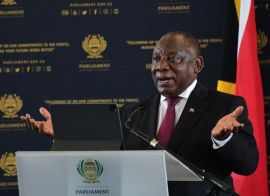President Cyril Ramaphosa says although government has made significant strides in improving the living conditions of South Africans, more needs to be done to ensure better quality of life.
The President was addressing a sitting of the National Council of Provinces (NCOP) during the Taking Parliament To The People (TPTTP) programme held in KwaZulu-Natal’s Ugu District Municipality on Friday.
“We have expanded basic services like water … we’ve also expanded electricity distribution and built homes. We have provided access to free primary healthcare, quality basic education and free tertiary education. Since 1994, the progressive and pro-poor policies of successive democratic administrations have lifted millions of people out of extreme poverty and improved their lives.
“And yet we know that we can no longer rely on these past glories as we witness severe challenges at local government, which is where service delivery happens,” he said.
The President reflected that much time has been spent on “diagnosing the problem” with poorly run municipalities and that the time has come to focus on an ideal municipality and “build such municipalities”.
“An ideal municipality should have a vibrant economy. It should have places where tourists want to visit. It must be inter-connected in many ways digitally and it must have people who are well trained and it must offer the best living conditions for our people. Such municipalities … should provide good access to health, education as well as recreational facilities.
“In such an ideal municipality not only are residents able to lead lives of quality and dignity, they are magnets for investment. In short, an ideal municipality is a place that people want to live in, that people want to work in and people want to bring their business and investment and people want to visit,” he said.
The President highlighted that one of the steps government is taking to fight “inefficiency, maladministration, lack of financial controls and poor governance” at local municipality level, is the new Local Government Municipal Systems Amendment Act.
“Amongst other things, [the Act] disallows municipal officials from also holding political office, defines competency criteria for the appointment of municipal managers and strengthens the performance evaluation process.
“This should be viewed alongside the process that we are embarking upon of professionalising the public sector, which was adopted by Cabinet last month. This makes specific proposals to ensure merit-based recruitment and promotion and more effective consequence management for all public servants.
“This is going to have a big impact on how government works at all levels,” he said.












